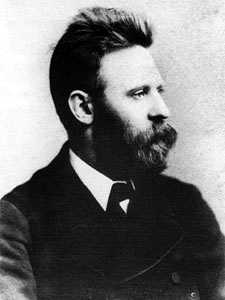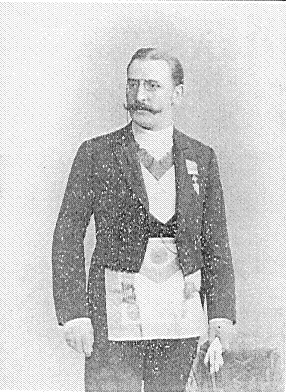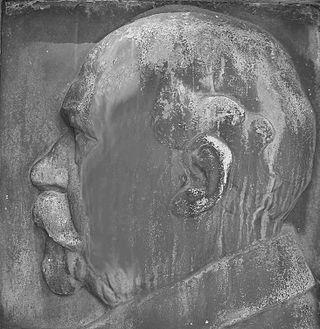
Johann Joseph "Hans" Most was a German-American Social Democratic and then anarchist politician, newspaper editor, and orator. He is credited with popularizing the concept of "propaganda of the deed".

The Kingdom of Lombardy–Venetia, commonly called the "Lombardo-Venetian Kingdom", was a constituent land of the Austrian Empire from 1815 to 1866. It was created in 1815 by resolution of the Congress of Vienna in recognition of the Austrian House of Habsburg-Lorraine's rights to the former Duchy of Milan and the former Republic of Venice after the Napoleonic Kingdom of Italy, proclaimed in 1805, had collapsed.

Albert Karl Theodor Reuss also known by his neo-Gnostic bishop title of Carolus Albertus Theodorus Peregrinus was a German tantric occultist, freemason, journalist, singer and head of Ordo Templi Orientis.

Ernst Fischer, also known under the pseudonyms Ernst Peter Fischer, Peter Wieden, Pierre Vidal, and Der Miesmacher, was a Bohemian-born Austrian journalist, writer and politician.

Joseph (Josef) Samuel Bloch was an Austrian rabbi and deputy of Polish descent.

Josef Weinheber was an Austrian lyric poet, narrative writer and essayist.

Josef Theodor Moroder, also known as the Lusenberger, was a painter and sculptor, the most prominent artist of the Moroder family from the Grödenthal in South Tyrol.
German individualist philosopher Max Stirner became an important early influence in anarchism. Afterwards Johann Most became an important anarchist propagandist in both Germany and in the United States. In the late 19th century and early 20th century there appeared individualist anarchists influenced by Stirner such as John Henry Mackay, Adolf Brand and Anselm Ruest and Mynona.

Paul Grottkau (1846–1898) was a German-American socialist political activist and newspaper publisher. Grottkau is best remembered as an editor alongside Haymarket affair victim August Spies of the Chicagoer Arbeiter-Zeitung, one of the leading American radical newspapers of the decade of the 1880s. Later moving to Milwaukee, Grottkau became one of the leading luminaries of the socialist movement in Wisconsin.
Der arme Teufel was a leading German-American anarchist magazine, published in German at Detroit, Michigan from 1884 to 1900, and edited mainly by the Detroit anarchist Robert Reitzel from 1884 until his death in 1898.

Josef Rank was a German-Austrian writer.
Bruno Kaiser was a Marxist scholar of German studies who became a journalist and, during the Nazi period, a resistance activist. In his later years he became, in addition, a distinguished librarian.
Horst Bartel was a German historian and university professor. He was involved in most of the core historiography projects undertaken in the German Democratic Republic (1949–1989). His work on the nineteenth-century German Labour movement places him firmly in the mainstream tradition of Marxist–Leninist historical interpretation.
Karl Čermak was a German socialist politician. A skilled organizer, Čermak emerged as a key leader of the labour movement in German Bohemia in the years preceding World War I. He went on to become a parliamentarian in the First Czechoslovak Republic.

Gustav Mayer was a German journalist and historian with a particular focus on the Labour movement. He fled Nazi Germany in 1933 and lived the final years of his life in England.
Johannes Sylvius Egranus was a German theologian, humanist, reformer and a friend of Martin Luther.
Wolfgang Schröder was a German historian. The early decades of his professional career were spent as a member of the East German historical establishment: the focus of much of his work was on the history of the labour movement. He nevertheless remained professionally active and made further important contributions through his published work and teaching during the years after reunification.
Josef Pfundheller was an Austrian writer and journalist, who also appeared as a playwright of the Alt-Wiener Volkstheater.
The Black Band were resistance groups of anarchist and anarcho-syndicalist youth and young adults in the last years of the Weimar Republic.

Wilhelm Josef Blos was a German journalist, historian, novelist, dramatist and politician (SPD). He served as a member of the imperial parliament (Reichstag) between 1877 and 1918, albeit with one three year break. After the end of World War I he served between 1918 and 1920 as the first president of the newly launched Free People's State of Württemberg.











